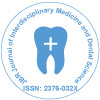Research Article
Helmet Attitudes and Practices among University Students of Dental and Medical Professional Courses in Vadodara, India
Thanveer Kalantharakath and Ramya Iyer*Department of Public Health Dentistry, K. M. Shah Dental College and Hospital, India
- Corresponding Author:
- Ramya Iyer
Senior Lecturer
Department of Public Health Dentistry
K. M. Shah Dental College and Hospital
A 302, Shreenath Classic Natasha Park Residency-2
Nizampura, Vadodara, Gujarat 390002, India
Tel: +91-9725036434
E-mail: ramya83_r@rediffmail.com
Received date: November 26, 2014; Accepted date: June 12, 2015; Published date: June 18, 2015
Citation: Kalantharakath T, Iyer R (2015) Helmet Attitudes and Practices among University Students of Dental and Medical Professional Courses in Vadodara, India. J Interdiscipl Med Dent Sci 3:180. doi: 10.4172/2376-032X.1000180
Copyright: © 2015 Kalantharakath T, et al. This is an open-access article distributed under the terms of the Creative Commons Attribution License, which permits unrestricted use, distribution, and reproduction in any medium, provided the original author and source are credited.
Abstract
Background: Increasing motor-cycle accidents warrant strict adherence to helmet use regulations; however awareness and attitudes of people tend to largely govern helmet use.
Objectives: To assess the practices and attitudes towards helmet use by medical and dental students of sumandeep vidyapeeth, Vadodara.
Methods: A cross- sectional pre- tested questionnaire survey using modified bicycle helmet attitude scale was conducted among medical and dental college students of a University in Gujarat, India. Information on subjects’ personal characteristics, the subjects’ frequency of helmet use, situations determining the use of helmet, knowledge on consequences of road traffic accident, potential of helmet to prevent head injury or death from fatal accidents, attitudes towards helmet use and barriers to helmet use were assessed. Data was compiled and descriptive statistics was computed.
Results: Only 30% of the surveyed subjects reported of unconditional helmet use while driving two- wheelers. More than half of the study participants believed that if they did not wear helmets, they were at a risk of injury from road accidents. 50% believed that injury as a consequence of not wearing helmet could affect their functioning at school. 50% of the study subjects reported that media was the chief contributor in promotion of helmet use for safe driving.
Conclusion: Although the surveyed subjects knew about the importance of wearing helmets and had positive attitude towards helmet use, the same did not translate to greater helmet use. Hence, a need for strict regulatory approach is realized for implementation of helmet use among two-wheeler riders.

 Spanish
Spanish  Chinese
Chinese  Russian
Russian  German
German  French
French  Japanese
Japanese  Portuguese
Portuguese  Hindi
Hindi